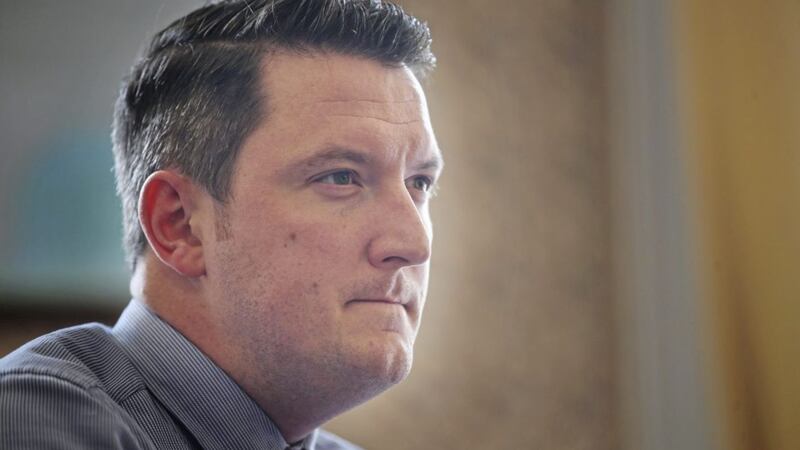The party election broadcasts for the two main parties said everything about the contrasting positions the DUP and Sinn Féin find themselves in as the assembly election campaigns move through the gears.
In the course of the two minutes and 32 seconds of the DUP’s radio broadcast, the party leader mentioned Sinn Féin three times, border poll on four occasions, the base word ‘divide’ and two further variations of the word, ‘divisive’ and ‘division.’
This is a back to basics campaign for the DUP. Like a cornered animal, they have come out fighting the only way they know how: appealing to base instincts, using a message laced with fear and antagonism to rally the faithful.
Divisive Border Poll. Sinn Féin! Divisive Border Poll. Sinn Féin!
Donaldson was at it again at the DUP’s election launch, fittingly held in an east Belfast cinema. For the DUP to pull off the feat of retaining their grip on the first minister’s office they will need to persuade enough voters to look beyond their calamitous handling of Brexit, central role in innumerable scandals and reckless conduct at Stormont, a task requiring a script and actors worthy of a Hollywood blockbuster production.
On the other hand, Sinn Féin took a different tack with their broadcast.
The party put forward to deliver their message for almost the entirety of the broadcast their North Belfast MP, John Finucane, who isn’t even a candidate in this election.
He talked about family members being unionists and others even belonging to the Orange Order. His message (ad verbatim) included assertions that ‘diversity makes us stronger’, is ‘part of who we are’, [this is] ‘a place in which we all belong’. ‘Whatever we do in the future, we will do it together’.
The broadcast radiated with the positivity, hope and confidence of a political party in the ascendant, likely on the verge of securing the first minister’s office in a historic development for politics in the north of Ireland. The appearance of Mary Lou McDonald and Pearse Doherty underscored the party’s unique selling point as an all-Ireland party, all the more potent for many nationalists now that Sinn Féin seem poised to lead the next Irish government.
It was also an astute move.
Finucane showed the party the way in 2019, being the first Sinn Féin candidate to build a progressive voting coalition, one that was required to oust the sitting DUP MP, Nigel Dodds, in the hotly contested constituency of North Belfast.
In an election contest seemingly destined to confirm the presence of a permanent third bloc within our politics, loosely termed the Others, Sinn Féin know the importance of making a connection with this group’s voting base in order to secure vital transfers and, with an eye to the future, to keep minds open to the prospect of Irish unity.
There are many twists and turns left in this campaign but, to date, Sinn Féin has played a blinder.
The party has quietly gone about softening Michelle O’Neill’s image since the furore surrounding the Bobby Storey funeral put the party on the defensive. O’Neill has been careful to emphasise the party’s progressive credentials at every opportunity, including supporting the Integrated Education Bill, in spite of knowing that this would cause some anxiety within the party’s heartlands due to concerns about the implications for other school sectors.
Last week, Michelle O’Neill used a pre-election business event to declare that the party’s pre-eminent priority at this time was not a border poll but rather dealing with the cost of living crisis, a shrewd move which takes some of the wind out of the DUP’s sails as the latter strive desperately to reduce this campaign to a proxy constitutional referendum.
Confidence discourages flag-waving and the repetition of slogans for the sake of it. A strengthened mandate implicitly adds credence to the campaign for constitutional change.
Eyes fixed firmly on the prize, republicans know that, for now, they hold the advantage.









